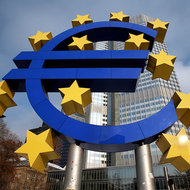 Hannelore Foerster/Bloomberg NewsThe European Central Bank in Frankfurt, Germany.
Hannelore Foerster/Bloomberg NewsThe European Central Bank in Frankfurt, Germany.
LONDON — European banks have been busy.
Financial institutions on the Continent have raised at least 40.7 billion euros, or $52.8 billion, in new capital as of the fourth quarter of last year, according to estimates by Citigroup.
The effort is part of policy makers’ push to increase banks’ core Tier 1 ratios, a measure of a firm’s ability to weather financial shocks, to 9 percent by June. Banks must raise a combined 115 billion euros by the summer to meet that target.
Activity over the next few weeks will add to the tally. Europe’s major banks report earnings in February, and Citigroup said it expected institutions to raise a further 24.6 billion euros by June 2012 through so-called retained earnings, a category that includes reductions in employee bonuses and cuts to overall bank lending.
Deutsche Bank of Germany, for example, could pocket up to 3.6 billion euros in retained earnings by June, based on Citigroup estimates. The figure would be more than enough to cover the 3.2 billion euro shortfall the European Banking Authority wants the bank to fill by this summer. Similarly, the Citigroup research shows BNP Paribas of France may add 4.1 billion euros in the same period through this method, well ahead of its 1.4 billion euro capital-raising target.
“BNP has huge capital needs, but can make the target in one swoop by retaining its shareholder dividend,” said an investment banker at a leading European firm, who spoke on condition on anonymity because he was not authorized to talk publicly.
While some of Europe’s largest financial institutions are likely to fill the capital gap by holding on to their profits, others will have to employ different strategies. So far, the most popular method for raising new money has been through so-called liability management exercises. Citigroup estimated European institutions had raised a combined 16 billion euros through the practice, which involves buying back, or exchanging, hybrid securities — investments that pay dividends like bonds, but can be converted into equity — at a discount from investors.
Accountancy rules allow financial institutions to book the difference between the original face value of the securities and the current discounted price as a profit toward their core Tier 1 equity. Raiffeisen of Austria, for example, has pocketed 1.3 billion euros toward its 2.1 billion euro target in this manner. The Italian bank Banco Popolare has raised a further 996 million euros.
Adjustments to banks’ balance sheets have outpaced so-called rights offerings, which allow existing shareholders to buy new stock in a company at a discount. Authorities had expected many institutions to tap investors for new capital. But only one bank, UniCredit, based in Milan, has done so. Its 7.5 billion euro rights issue, which is expected to be well subscribed by investors, closes on Friday.
Many firms are relying on multiple strategies. Along with its rights offering, UniCredit is reorganizing its balance sheet. On Wednesday, the Italian lender said it would buy as much as 3 billion euros of hybrid securities at a discount of up to 50 percent. The move could raise up to 500 million euros toward the bank’s core Tier 1 ratio. UniCredit is also planning to issue up to 25 billion euros of covered bonds — debt securities that are backed by the bank’s own assets — to ease its financing problems, according to a filing with the Luxembourg Stock Exchange on Wednesday.
Other banks are shedding assets to meet the new requirements. Citigroup estimates European banks have disposed of operations worth almost 100 billion euros, as of the fourth quarter of 2011. That helped firms, including Banco Santander of Spain, to increase their capital reserves by a combined 6.6 billion euros over the period.
“The list of asset sales is the longest I’ve seen in 10 years,” said Richard Thompson, a partner at accountancy firm PricewaterhouseCoopers in London. “Banks want to reshape their balance sheets to focus on specific territories or sectors.”
Article source: http://dealbook.nytimes.com/2012/01/25/european-banks-raise-53-billion-to-appease-regulators/?partner=rss&emc=rss